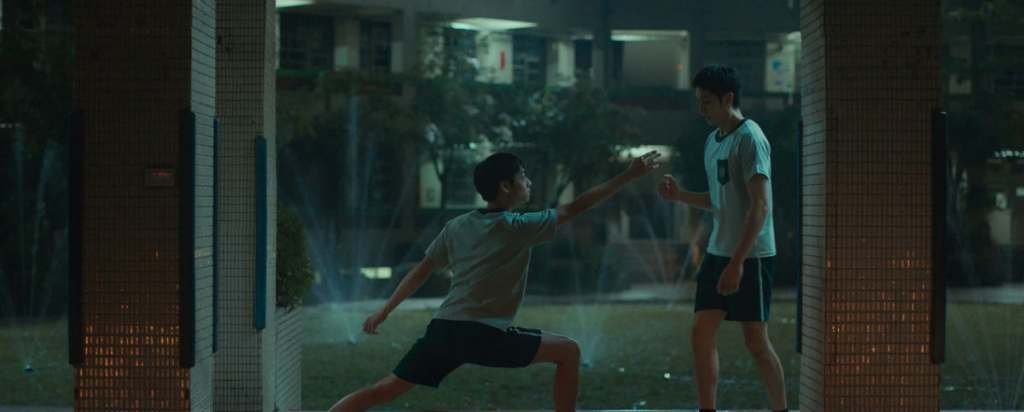4.5 min. read
Getting the Best Director win over at Karlovy Vary this month, burgeoning director Nelicia Low’s latest drama, Pierce, now makes its case before audiences at the 23rd New York Asian Film Festival for its North American Premiere.
Zijie (Liu Hsiu-Fu) is a young fencing prospect who lives with his mother (Ding Ning). They share a pretty dark and tragic past, one outlined by the death of his father, and even more prominently, the jailing of his older brother, Zihan (Tsao Yu-Ning), who himself was once a three time fencing champion on their club’s team.
As the film tells it, Zihan was jailed seven years earlier for presumably killing his opponent during a match, and its within the first act of the film when Zijie suprisingly learns that Zihan is finally getting out of jail. This isn’t something the mother wanted Zijie to find out either.
Until now, any family dinners he and Zijie share with friends and talks she shares usually results in her spewing some malarkey about how Zihan is overseas studying in medical school. Furthermore, Zihan’s leave from prison wasn’t something she wanted Zijie to find out, which only compels Zijie to make the first move in hopes of reconnecting with his embattled brother.
The remainder of Pierce is a stark and chilling exploration of sibling and family dynamics through the lens of a meek teenager who is coming into his own. Where Zihan fits into the formula here lends further dialogue to the subjectivity, as the pairs relationship teeters from unease to a sense of healing.
As we try to parse just who Zihan is through Zijie’s eyes, Pierce never relents on the element of uncertainty that so nurtures the real mystery at the core of the movie. Read that first sentence again, and you’ll get a good sense of what I mean; There’s at least one scene where the camera finally pulls into focus with Zijie’s POV, watching as Zihan gives him pointers on how to improve his fencing. It’s a perfect snapshot into the toils of our teenage years and the kind of self-discovery we long for.
Additionally, it is also a perfect setup in foreshadowing, because there’s more to unravel in figuring Zihan out as the film moves forward. The sight of a young boy looking at Zijie and crying as Zihan puts on airs for their disaproving mother during another dinner gathering lends further uncertainty into the film’s development and recapitulation.
The film also introduces the character of Zhuang, played by Lin Tsu-Heng, who takes a liking to Zijie’s mother and forms a relationship with her. It’s not until here that the subject of Zijie’s own romantic interests come into question, and we eventually meet the role of club member and fellow fencer Jing Hui, played by Rosen Mu. It’s a side quest to a story full of its own contours which makes the arc between Zijie and Hui all the more gratifying and welcoming, and a determinedly standout development point for Zijie who until now has mostly been meek and apprehensive.
These characteristics are key to the enjoyment of seeing Zijie flourish, adjacent from the spotty reunion he shares with Zihan. As Low writes and directs it, theirs is a brotherhood that proves more nurturing to Zijie’s strength and growth than anything, which makes their mother’s apprehension to their closeness both bewildering, and less unambiguous as the film progresses.
Pierce makes it more than clear that Zihan has a darker side than we should believe. The brilliance behind this aspect is the way Low shrouds that darkness by drawing an even more consuming analysis of family turmoil, with an anecdotal look at what it means for formerly incarcerated youths to matriculate back into society.
Being a former fencer herself, Low’s use of fencing in the film’s framework proves immensely entertaining through and through as a modifier that not only helps gauge our characters, but the filter through which these characters are written and conveyed. Like two fencers in a duel, there are two sides to a story, and each story comes with its nuances and complexities that make up who the fighter is. The key, however, lies beyond the kind of binary constraints symbolically explored here in Pierce (i.e. winning or losing, good and evil, black and white).
The ending feels more bittersweet than the overall recapitulation which takes an inevitably dark and violent turn, and this will have a different impact on everyone watching. What’s important though, is how fully apt Low is at keeping viewers on their toes, and Pierce, in her debut outing, is a testament to that.
Pierce was reviewed for the New York Asian Film Festival which runs from July 12 through 28.
Lead image via Magnify


